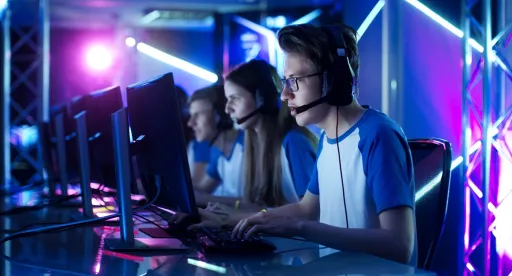Amidst the coronavirus pandemic that has disrupted traditional sports and the entertainment industry, esports and the broader video gaming industry seem to have barely missed a beat, perhaps even growing, as a world in various stages of lockdown has become singularly (and necessarily) focused on remote online activity – the space where esports and video gaming live and thrive. Yet not all the news is so rosy. In recent weeks, the esports and video gaming industry has been rocked by a torrent of allegations of sexual assault, harassment, racism, and discriminatory conduct, publicly leveled against popular gamers and high-level gaming executives. This is the industry’s pandemic, and recent developments raise serious questions about whether and how the industry can get to a cure or the right sort of treatment. The legal and business risks are significant for stakeholders unwilling to examine and address the issue proactively.
So, what is going on? Over the past month, dozens of people have gone public on various online streaming platforms to allege gender-based discrimination and harassment, as well as sexual assaults against streamers, content creators, and executives. The accusations, occasional apologies, and subsequent public discourse have been playing out over the past several weeks on the streaming and social media platforms that are the lifeblood of the gaming industry, including the following:
-
High profile Destiny streamer SayNoToRage was banned from the streaming platform Twitch after he was accused of verbal harassment, groping and propositioning by multiple women.
-
Game developer and publisher Ubisoft (known for the game Rainbow 6 Siege) reportedly saw the departure of several high-level company officers in the wake of abuse and harassment allegations, which included a female employee being choked at a game’s launch party.
-
Evil Geniuses, one of the industry’s largest esports organizations, which fields esports teams in several competitions, dumped Dota 2 caster and content creator GranDGranT in the wake of sexual assault and harassment claims by several women.
These are but a few examples, and a quick internet search of “esports and MeToo” will bring up many more and all their sordid details, including various accounts of the sexual abuse of minors by prominent industry figures.
Revelations about sexual harassment and discriminatory conduct in the video gaming industry are nothing new. Over the years, we have repeatedly reviewed the related legal issues and risks (see here, here, and here) that the video gaming industry would face as it grew and aspired to enter or become part of the commercial mainstream. Its history is checkered with video games involving the sexual objectification of and violence against women and with unregulated, online communities where anonymous gamers have been unconstrained to behave in offensive and discriminatory ways. Given these cultural legacies, today would not mark the first time that the #MeToo hashtag has been invoked within the industry. Indeed, it has experience with MeToo-like moments that predate the Harvey Weinstein scandal and the establishment of the #MeToo hashtag in the global lexicon (see here). While it is perhaps unfair to generalize, even as the industry has matured commercially, these darker aspects of the gaming industry appear to persist.
So what’s the industry to do? The key stakeholders – game developers, publishers, esports organizations, corporate sponsors, and streaming platforms – must carefully self-examine the role that each of them plays, not only in addressing claims of sexual harassment and other wrongful discrimination, but also in preventing such conduct from happening in the first place. This is no easy task. The video gaming industry is a sprawling global landscape of seemingly infinite contractual relationships. An esports company may adequately turn to some old-school equal employment opportunity and antidiscrimination policy and training for its direct employees, like its front office personnel or Overwatch players, but then wholly ignore such concerns with the Fortnite influencer it engages as an independent contractor.
This may be where a significant compliance gap exists within the industry. Just look at the majority of recent stories -- they mostly involve prominent casters, streamers, and influencers who are not employed by entities that contract with them, including esports organizations (like Evil Geniuses), streaming platforms (like Twitch and YouTube), and even commercial sponsors. There is something happening here that goes beyond streaming or social media platforms policing their sites for internet trolls who violate terms of use policies with unacceptable discriminatory behavior. This is individual talent who are engaged as independent contractors by those very same platforms, who are paid handsomely, and whose conduct may be circumscribed only by the terms of their contracts, and perhaps would fall outside employment discrimination laws, which often serve as the primary source of civil redress for the types of discriminatory harassment at issue here.
There are several reasons why a business might want to examine its relationship with individual video gaming talent and related expectations carefully:
-
Worker Misclassification. As a legal matter, the individual talent may not qualify as an independent contractor, but instead may be a misclassified employee of the contracting business.A proper determination of a worker’s contractor or employee status is often made via a case-by-case assessment, based on a multitude of factors that are generally premised on control over the worker and that can vary from jurisdiction to jurisdiction depending on the legal issue at hand.Recent legislative trends, specifically in California, where many gaming companies are based, have made it harder for businesses to prove their independent contractors are not misclassified employees.An unanticipated resetting of a worker’s status from independent contractor to employee can trigger potential “employer” liability for the “employee’s” conduct, including under principles of agency, respondeat superior, and vicarious liability.
-
Liability for Independent Contractor Conduct. Even a properly classified individual contactor can create legal risk for the contracting business.Under most employment discrimination laws, an employer’s duty to provide a safe and nondiscriminatory workplace includes preventing and stopping sexual harassment and other discriminatory conduct by its independent contractors.Conversely, in a growing number of jurisdictions (e.g., Maryland, Minnesota, New York, New York City, and Rhode Island), independent contractors themselves are afforded the same protections and rights as employees under the employment discrimination laws.
-
Business Sense. Putting aside the legal risk, in a growing industry that is looking to attract mainstream consumers and commercial sponsors, carefully managing contractual relationships with individual talent is not only the right thing to do, it makes good practical business sense.The potential economic consequences can be severe for businesses that appear to facilitate sexual harassment and other discriminatory conduct.Corporate sponsors simply will not abide, as reported recently in both the sports and broadcast industries.Moreover, a failure to engage proactively with individual talent from the start could lead to complicated contractual disputes should any fallout ensue.Twitch recently banned prominent streamer Dr. Disrespect, who reportedly has an exclusive, eight-figure contract with the streaming platform. Neither side is talking, the world is speculating that the ban is associated with the recent #MeToo revelations, and it seems unfathomable that Twitch would be relying solely on its community guidelines and terms of service to navigate this potentially significant contractual dispute.
The onus truly is on esports organizations and streaming platforms to do more – to not only police the conduct of their talent, but also to help prevent the harassment and discriminatory behavior from occurring in the first place. The development and implementation of meaningful corporate policies and compliance programs cannot be narrowly restricted to traditional employment law concepts. Fearful of jeopardizing a worker’s status as an independent contractor, businesses tend to avoid doing the sort of anti-harassment compliance work associated with an employer’s obligation. This is a common and unfortunate misperception. Properly drafted contractual terms and vigorous, sophisticated contractor compliance programs can set clear and appropriate expectations concerning the legal obligations and conduct of a business partner. Key stakeholders in the esports and video gaming industry would be wise to consider them a potential preventative treatment for the seemingly intractable pandemic of sexual harassment and discrimination plaguing the industry.
Quinn D’Isa, a Foley Summer Associate in our New York office, contributed to this article.




 />i
/>i

